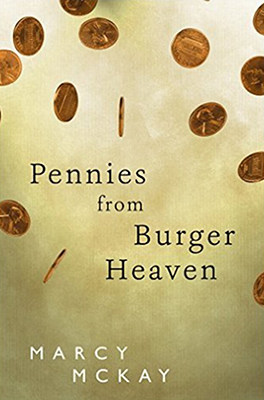 Michelle Newby is contributing editor at Lone Star Literary Life, reviewer for Foreword Reviews, freelance writer, member of the National Book Critics Circle, and blogger at www.TexasBookLover.com. Her reviews appear or are forthcoming in Pleiades Magazine, Rain Taxi, World Literature Today, South85 Journal, The Review Review, Concho River Review, Monkeybicycle, Mosaic Literary Magazine, Atticus Review, and The Collagist.
Michelle Newby is contributing editor at Lone Star Literary Life, reviewer for Foreword Reviews, freelance writer, member of the National Book Critics Circle, and blogger at www.TexasBookLover.com. Her reviews appear or are forthcoming in Pleiades Magazine, Rain Taxi, World Literature Today, South85 Journal, The Review Review, Concho River Review, Monkeybicycle, Mosaic Literary Magazine, Atticus Review, and The Collagist.
Lone Star Book Reviews
of Texas books appear weekly
at LoneStarLiterary.com
Marcy McKay
SkipJack Publishing
Paperback, 978-1-939889-33-1 (also available as an e-book), 340 pgs., $12.99
December 18, 2015
Copper Daniels, a brash and scrappy eleven-year-old girl, and her mother, Corrine, are homeless. They sleep beneath a statue of an angel in a cemetery in the fictional Texas city of Remington. One morning Copper awakes alone. Corrine is missing and Copper, terrified that a her mother is one of the “Disappeareds,” the latest victim of a serial killer stalking the “Nobodies” of Remington, sets out to find her. Copper searches for clues to her mother’s disappearance while dodging pimps, junkies, the police, televangelists, and gangbangers who are also looking for Corrine. Copper, prickly and paranoid, must learn to trust someone besides herself, accept help, and be a better friend if she’s to survive the hunt.
Pennies from Burger Heaven, Marcy McKay’s first novel and the first in a planned series, won the Writers’ League of Texas Best Mainstream Novel manuscript contest in 2015. This is an almost unrelievedly grim and painful story. The relationship between Copper and her mother is not a proper one of parent and child. “We’re way more than mother and daughter,” Copper says proudly. “We’re business partners and best friends.” They panhandle for cash on street corners, and when that proves insufficient to support her mother’s meth addiction, Copper hides under the bed in by-the-hour motel rooms while Corrine earns more money on top of the bed.
Copper narrates Pennies from Burger Heaven. An extraordinarily bleak first-person narrative told from the point of view of a young child is a difficult technique that, in this case, seesaws between poignancy and cognitive dissonance. As children will, Copper blames herself for her mother’s troubles, but she is also conflicted as she realizes her mother’s betrayals. Copper’s inner monologue reflects the incomplete understanding and assumptions of a child attempting to compensate for the failures of the adults charged with protecting her and to rationalize her mother’s motives and actions as she discovers each additional lie.
McKay’s plot is intricate and twisty, if overloaded with lurid elements and near-constant violence, and the action, with a touch of the supernatural, proceeds at breakneck pace. McKay is exceptionally skilled at characterization and atmosphere. The Remington ghetto is crowded with disparate, colorful personalities with nicknames like “Turdmouth” and “Corn Dog,” not all of whom are completely insane. The streets are cold and grimy, lined with pawn shops, liquor stores, and clinics that will buy your blood if it’s clean. The ugliness of the landscape and narrative is infrequently relieved by Copper’s humor. She tells the stories of some of the people buried in the cemetery where she and her mother sleep, such as Ronald Freedmont, whose wife “comes here every week to yell at him.”
Unfortunately, as happens too often today, poor copyediting and inattention to detail distract from the finer elements of Pennies from Burger Heaven.
* * * * *

